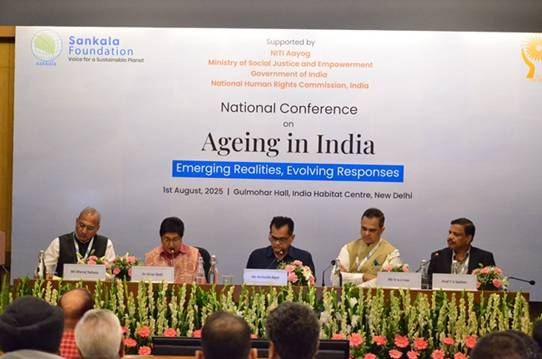National Conference Charts Inclusive Path for India's Ageing Population by 2050
In his special address, Dr. Vinod K. Paul, Member (Health, Nutrition & Education), NITI Aayog, emphasized that families must remain the cornerstone of elderly care.

- Country:
- India
On 1st August 2025, New Delhi played host to a transformative national conference on ageing, titled “Ageing in India: Emerging Realities, Evolving Responses”, jointly organised by the National Human Rights Commission (NHRC) and Sankala Foundation, with support from NITI Aayog, and the Union Ministries of Social Justice & Empowerment and Health & Family Welfare. This high-impact, day-long event brought together policymakers, academia, civil society, and healthcare professionals to address the emerging demographic shift in India—an ageing population that will soon reshape the country’s socioeconomic fabric.
Reimagining Ageing as an Opportunity, Not a Challenge
With India's elderly population projected to reach 35 crore by 2050—making up nearly one-fifth of the total population—the conference reframed ageing from being a policy burden to a human development opportunity. It focused on integrating human rights, dignity, community care, and economic inclusion into national policy frameworks for the elderly.
Justice Shri V. Ramasubramanian, Chairperson of NHRC, in his inaugural address, grounded the conversation in India's ancient cultural values. Drawing from Sangam literature and the Yajur Veda, he underlined the need to integrate traditional respect for the elderly with modern policy innovation. He reaffirmed NHRC’s commitment to senior citizens through advisories, research, and suo motu cognizance of rights violations.
Keynote Insights: Ageing in an Indian Context
Shri Bharat Lal, NHRC Secretary General, set the tone with alarming yet critical data—one in every five Indians will be a senior citizen by 2050, signalling an urgent need for family and community-based care models. He highlighted the NHRC’s 2024 advisory on the Rights of Widows and the COVID-19 guidance for protecting older persons, as foundational policy contributions.
He also launched the report titled "Ageing in India: Challenges and Opportunities", which advocates inclusive, decentralised, and culturally contextual elderly care frameworks, inspired by international best practices from Scandinavia and Japan.
NITI Aayog’s Vision: Empowering the Family Unit
In his special address, Dr. Vinod K. Paul, Member (Health, Nutrition & Education), NITI Aayog, emphasized that families must remain the cornerstone of elderly care. He called for a healthcare and social security ecosystem that enables families to fulfill this role, while also leveraging community and technology-based solutions for wider coverage and accessibility.
Thematic Sessions: Exploring Multidimensional Responses
Four thematic sessions formed the heart of the conference, each curated to address different facets of ageing:
-
Strengthening Elderly Welfare: Policy and Practice Chaired by Shri Amit Yadav, Secretary, Ministry of Social Justice & Empowerment This session discussed frameworks for pension access, housing, food security, and mobility.
-
Health and Mental Wellbeing of the Elderly Led by Smt Preeti Sudan, Former UPSC Chairperson & Health Secretary Speakers highlighted the need for integrated geriatric healthcare, mental wellness support, and home-based care models.
-
Leveraging Ageing for Growth and Development Moderated by Shri Amitabh Kant, Former G20 Sherpa & ex-CEO, NITI Aayog Emphasis was laid on elderly contribution to the silver economy, urging investments in lifelong skilling, financial inclusion, and intergenerational engagement.
-
Shaping Futures: Preparing for an Ageing Society Chaired by Dr. Vinod K. Paul This forward-looking discussion explored policy preparedness, technology integration, and insurance innovations.
Eminent Speakers and Global Perspective
Noteworthy participants included:
-
Dr. Kiran Bedi, Former Lt. Governor of Puducherry
-
Shri Amarjeet Sinha, Former PMO Advisor
-
Shri V. Srinivas, Secretary, Pension & Pensioners' Welfare
-
Dr. Sanjay Wadhwa, AIIMS
-
Shri Mathew Cherian, HelpAge International
-
HE Amb’r Lim Sang Woo, Embassy of South Korea
-
Shri Yudhistir Govinda Das, ISKCON
-
Senior representatives from UNFPA, Azim Premji University, Samarth Elder Care, and Vayah Vikas
These thought leaders advocated for a collaborative model—with states, panchayats, civil society, startups, and international partners sharing responsibility for creating a safe, dignified, and productive life for India’s elderly.
Emerging Themes and Conference Outcomes
Some of the key conclusions and policy recommendations included:
-
Elderly Aspirations Must Begin Early: Ageing should be approached proactively through early lifestyle adjustments, financial planning, and active living.
-
Role of Technology: Advancements in AI, telemedicine, and assistive devices can empower seniors, reduce dependency, and expand access to care.
-
Family and Community Are Central: Indian cultural values must be leveraged to ensure that family-led care, supplemented by community support, forms the model of elderly care.
-
Adaptable State Models: Kerala’s palliative care programme was recommended as a scalable template for other states.
-
Encouraging Inter-State Competition: Creating a competitive ecosystem among states will help push elderly-focused innovations and service delivery.
-
Integrating the Silver Workforce: Seniors with experience and skills can remain economically active, especially in knowledge and mentorship roles.
-
Silver Economy & Financial Security: Suggested policies include long-term care insurance, pension portability, and digital inclusion to integrate elders into India’s growing silver economy.
A Collective Call to Action
The conference concluded with a resounding call to all stakeholders—government bodies, academic institutions, NGOs, private sector entities, and citizens—to recognise the elderly not as dependents, but as resources of knowledge, culture, and resilience. It urged the creation of intergenerational alliances and policy ecosystems that protect rights, foster autonomy, and restore dignity to India’s senior citizens.
The Road Ahead
As India prepares for its demographic transition, the NHRC-led initiative has laid a comprehensive and inclusive roadmap. By promoting rights-based, culturally embedded, and technology-supported responses, this national dialogue has created the blueprint for a compassionate, prepared, and ageing-resilient India.










